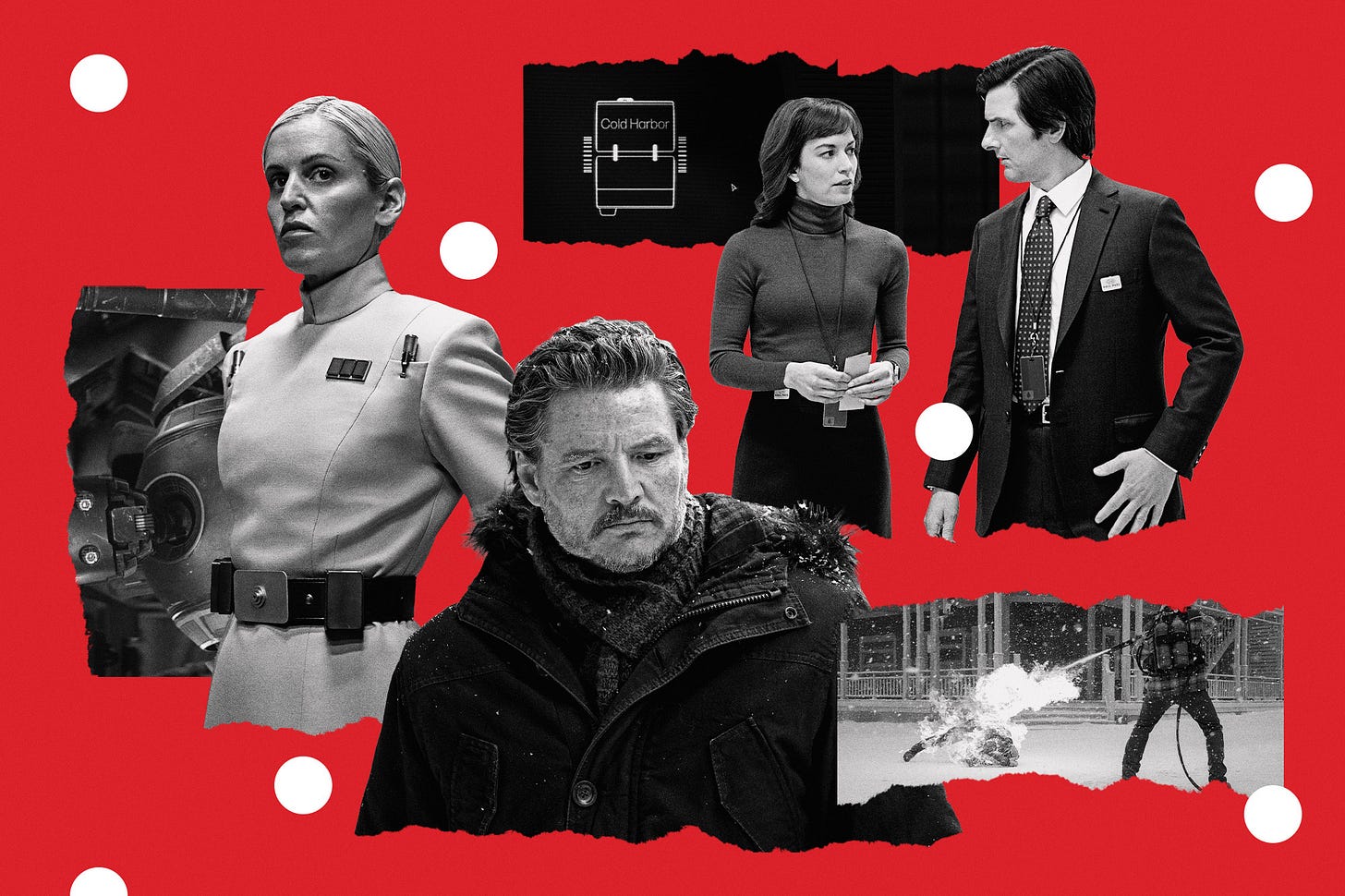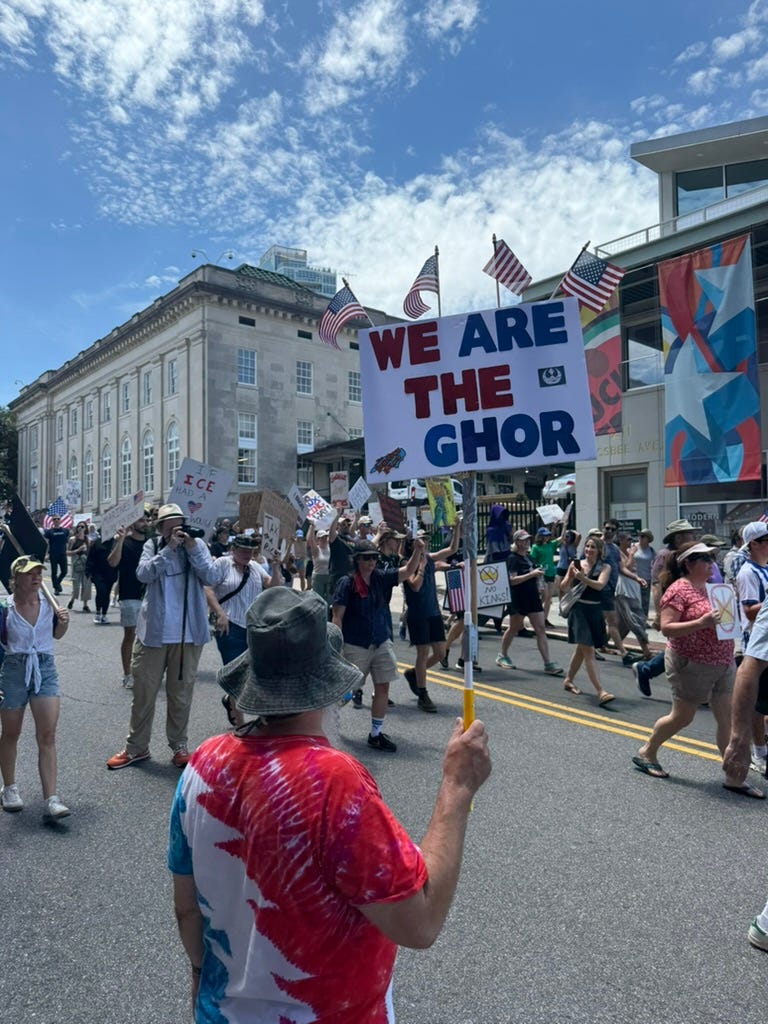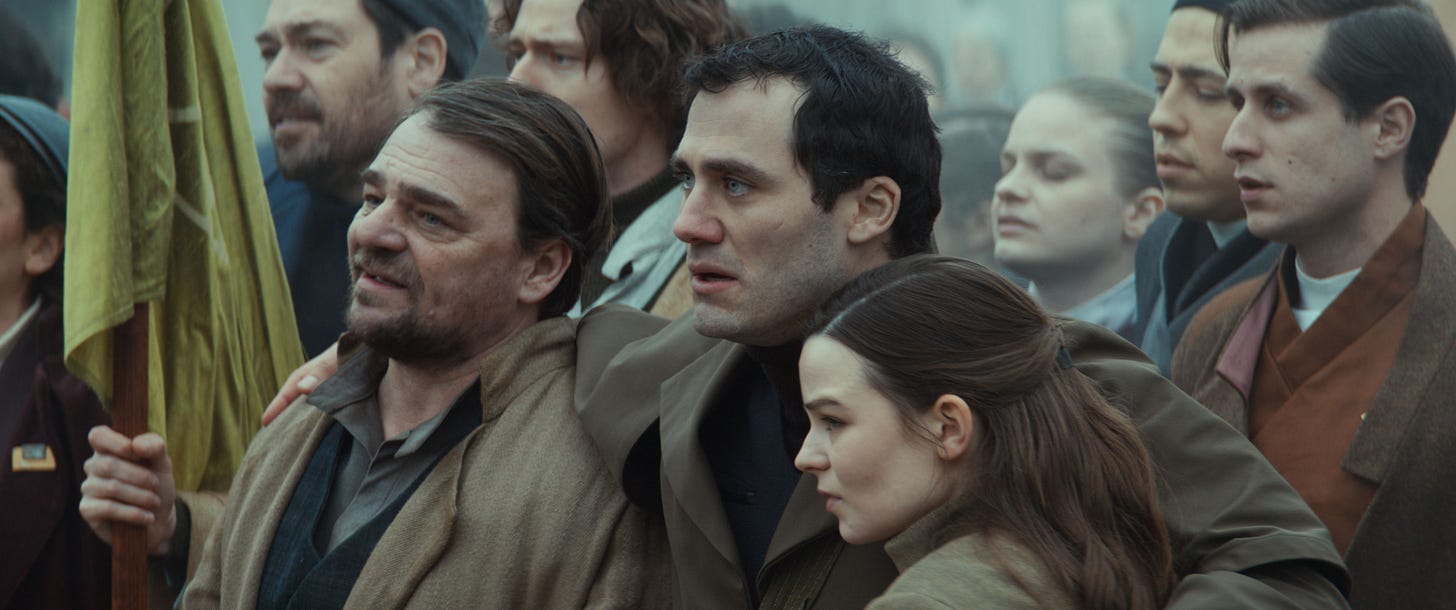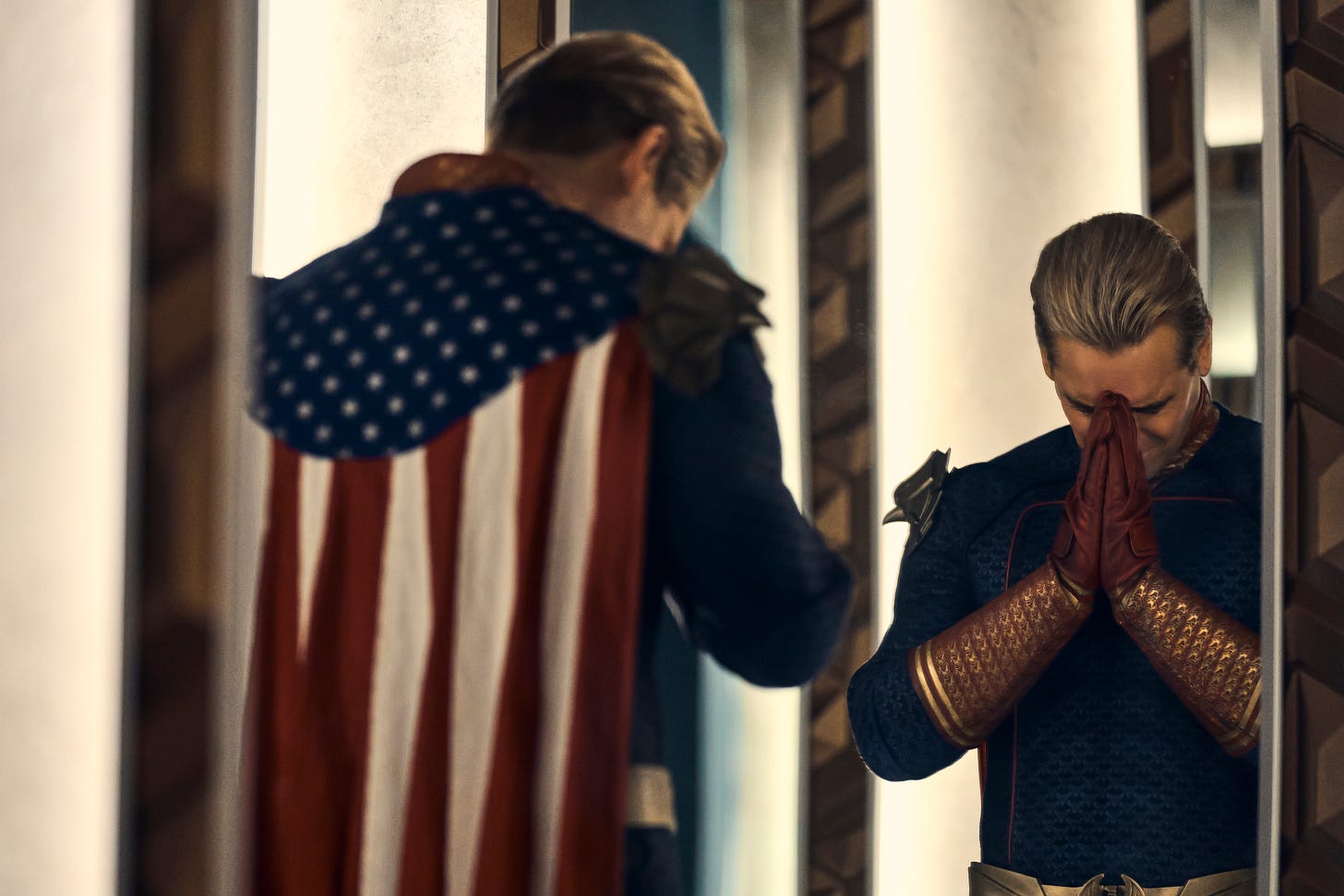‘Andor,’ ‘The Last of Us’ & Sci-Fi Shows That Went Political This Year
How some of the best confront a strange new universe, not that far, far away

Today’s the end of my 5-part series about the major trends dominating Emmy season — I hope you’ve enjoyed it as much as I have! ICYMI, I talked about billionaires puppeteering the president, shows putting L.A. in the spotlight, ambitious cinematography that got everyone talking and the on-and-offscreen pairings that made TV feel like one big reunion.
“We have friends everywhere.”
It’s a deceptively simple, even welcoming phrase for a protest sign, as seen in cities around the country during last week’s No Kings demonstrations. Unlike the more obvious pop culture references spotted out there, it could fly right over the heads of the uninitiated. Less so with another sign I spotted at my own local protest, featuring a word that’s not English, but instantly familiar to those who have spent time in a galaxy far, far away.

Star Wars has always been a metaphor for modern-day political struggles, from the stormtroopers modeled after Nazi Germany to the Trump 1.0-era protest sign “A Woman’s Place Is In the Resistance.” But the release of the second season of Andor this spring, just a few months into a presidential administration full of authoritarian impulses, has made the metaphor difficult to ignore.
The phrase “we have friends everywhere” is a passcode of sorts among the rebels of Andor, including the show’s titular hero, Cassian, played by Diego Luna. It’s a phrase handed over to prove you are part of the team, but also a reminder for those speaking it of the power of the network they are building. “We Are the Ghor,” meanwhile, comes from a song sung by protesters on the planet Ghorman, a group inspired by the French Resistance, shortly before a relentless Empire army massacres them. A little dark for an inspirational protest sign, sure — but probably even more appropriate to the current mood than another more straightforward Andor phrase, “Rebellions are built on hope.”
“Real rebellion is not clean, not cinematic, not safe,” wrote Ana Marie Cox in The New Republic about the Andor-themed signs carried by protesters in Texas who attended despite genuine fears of political violence. “It’s built by people who are afraid — and still show up.”
I had long planned to end this five-part Emmy season series by writing about the frighteningly real sci-fi and fantasy of our moment, from bloodthirsty superheroes to killer fungi. The role Andor played in last weekend’s protests made the connection feel entirely unavoidable — and then Ted Cruz trying to deploy his own Star Wars reference made it even clearer that when we attempt to talk about the big things facing us, we often lean on pop culture to explain it. Some more successfully than others.
Rebel Yell

Andor creator Tony Gilroy has studiously avoided comparing anything about his show to what’s happening today, be it the conflict in Gaza or anti-Trump protests. “I honestly want the show to be timeless. My characters are based more on Trotsky than Trump,” he said in one interview. In others, he’s pointed to his interest in historical revolutions in Haiti, France, Russia and beyond as the show’s inspiration. When I spoke to Gilroy and Luna together for the podcast, our conversation was more about the show’s rebellious spirit within the context of Hollywood than its broader political implications. (“It’s tough to get a movie off right now, and the world sucks,” was one especially pointed quote.)
Still, Gilroy’s avoidance of political hot buttons is understandable. He’s made an expensive show for Disney, a company that’s learned its lessons about wading into culture wars, from a same-sex kiss in Lightyear to this spring’s box office flop Snow White, which was at the center of a conservative backlash. Besides, Gilroy is undoubtedly aware that people will connect the dots, regardless of what he says. And he’s not the only TV creator who’s wary of putting too much emphasis on the allegory at the heart of his science fiction.
“I think we overestimate how much people apply what’s happening in the world around them to their experience watching a television show or going to see a movie,” The Last of Us creator Craig Mazin told Indiewire ahead of the show’s season two premiere. “People do often connect to these things on their own terms.”
It’s the universal emotions, Mazin argued, that are the point of The Last of Us, not the perceived politics of the show’s post-apocalyptic setting, where Joel (Pedro Pascal) and Ellie (Bella Ramsey) journey through an America ravaged by a strain of fungus that turns people into infected undead.
“None of us are living in a mushroom apocalypse — not yet. Feels like we’re teetering, but not there yet,” Mazin continued, revealing a bit of that old personality that used to relish sparring with conservatives on Twitter. “But we connect with the story of Joel and Ellie because we understand their story isn’t about a mushroom apocalypse. Their story is about fatherhood. It’s about childhood. It’s about love and loyalty. It is about the links we go to keep the people we love safe and the ways in which we damage them by trying to keep them safe.”
The second season of The Last of Us is based on the sequel game, released in 2020, which means some of the political debates surrounding the new season have been ongoing for years, including backlash to Ellie’s romantic relationship with fellow survivor Dina (Isabela Merced). But beyond its perceived commentary on the Israel-Palestine conflict or government overreach, The Last of Us is most potent when it captures a national mood: a sense that nobody is coming to save us, and that, as Mazin emphasized, keeping our loved ones safe is not remotely as simple as it seems.
Look, Up in the Sky

Is anyone willing to break out of metaphor and speak directly to the current moment? There may be no one doing it more vocally than Eric Kripke, whose superhero satire The Boys has been a stalwart hit for Amazon’s Prime Video, airing its fourth season last summer and with a fifth planned for next year. The show’s evil spin on Superman, named Homelander and played by Antony Starr, has “always been a Trump analogue.” And with the fifth season set to be released during the second Trump administration, Kripke said, “There’s been a total of zero notes about pulling our punches or about making things less political or less savage.”
Just because the intent is clear, though, doesn’t mean it always gets read that way. Last season, Homelander plotted a January 6-style coup. When fans responded by complaining that The Boys had suddenly gone “woke” and “anti-Trump,” Vox’s Alex Abad-Santos wrote that they were “excruciatingly late to this observation.” Same goes for Andor, which prompted Newsbusters to claim that the press was “retconning” the show into being about resistance, and for Severance, whose depiction of an evil corporation has been accused of not being anti-capitalist enough.
With bad-faith interpretations lurking around every corner, it's no wonder so many showrunners are hesitant to explain their allegories beyond what you see onscreen. As potent as all of these shows can feel when compared to our current moment, it really is what Mazin said: the characters, the emotions and the storytelling are what matter most. Take the final moments of this season of Severance, in which Adam Scott’s Mark finally rescues his wife Gemma (Dichen Lachman) from her prison inside the Lumon corporation. But instead of running off together to freedom, Mark lets Gemma escape and stays behind with Helly R. (Britt Lower), a fellow severed employee.
As Mark and Helly run away holding hands — “like wild horses, free but trapped,” as Lower put it to me when we spoke earlier this year — the frame freezes before we can tell if it was actually a good decision or not. We’ll have to wait until season three for showrunner Dan Erickson to tell us the answer. But that feeling of waiting for the other shoe to drop — what could be more relatable in 2025 than that?





